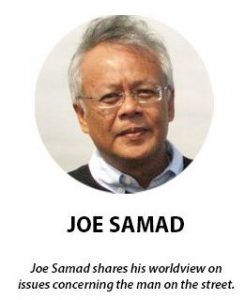Borneo states concerned about Jakim’s overreach

Times have changed, but Jakim seems to be living under a rock.
Joe Samad, FMT
Sabah and Sarawak did not form Malaysia with Malaya to relinquish the autonomy of their people to the whims of the Islamic development department (Jakim).
The Malaysia Agreement 1963 (MA63) was based on the understanding that the Borneo states would retain a significant degree of independence, including in matters related to religion and culture.
In a recent podcast with lawyer-activist Siti Kasim and former law minister Zaid Ibrahim, it was revealed that Prime Minister Anwar Ibrahim’s administration had directed the placement of Jakim officers within government departments.
This move sparked public concern, especially in Sabah and Sarawak, where religious and cultural diversity is central to the local identity.
Following the backlash, Na’im Mokhtar, the minister in charge of religious affairs clarified that Jakim officers are only assigned to certain government departments and agencies to organise religious programmes.
He stressed that these officers are not involved in policy making, seeking to address concerns raised by an interfaith group regarding the presence of Jakim personnel.
Nonetheless, this issue highlights the delicate balance between federal directives and the distinct cultural and religious autonomy of Sabah and Sarawak, as enshrined in the Malaysia Agreement 1963 (MA63).
Most government departments in Sabah have their own interfaith religious programmes and celebrations without any necessity for Jakim officers to be present.
The deployment of Jakim officers for such a purpose is a waste of taxpayers’ money. They should be deployed to monitor food quality in many hostels and food stalls as many food poisoning cases have been detected lately.
In another controversy, Jakim is considering the possibility of making halal certification compulsory for restaurants and food establishments that do not serve pork or alcohol. Na’im said obtaining halal certification is currently optional for food business operators.
It seems that Jakim has nothing better to do all day but to create controversies and make life difficult for business people.
Sabah and Sarawak are bastions of religious tolerance and multi-culturalism is under threat by all these announcements.
Surely, with billions allocated to Jakim annually, one would have thought that they would use the money to look after the welfare of Muslims in need, especially women, children and the underprivileged.
Why come out with policy after policy that does not add value to Islam or smears the name of a beautiful religion?
Many of the seafood restaurants in Sabah and Sarawak carry the sign “serve no pork” but sell beer.
This is to cater for many intermarriages in Sabah and Sarawak that have no issues with the local cultures and norms. Since the formation of Malaysia many local waitresses have worn the tudung when serving customers without any issues.
These restaurants are also frequented by many Muslims from Peninsular Malaysia who love Sabah and Sarawak’s famous seafood. Why meddle in the cultural norms of the Borneo states?
Another worry for many is the reported engagement sessions for the proposed amendment of the Syariah Courts (Criminal Jurisdiction) Act 1965 (RUU 355) with a report scheduled for presentation to the Cabinet before its anticipated tabling in Parliament later this year.
The RUU 355 has been a controversial subject since then prime minister Najib Razak allowed PAS president Abdul Hadi Awang to table a private members bill in parliament.
Now it seems that Anwar’s Madani government wants to continue this bill without explaining what the purpose is for increasing the harshness of punishment when the civil courts can handle the same crime. Harsher punishments have never been a deterrent. It is better to spend the money on teaching moral values and civic responsibility instead.
“Malaysia Madani”, as I understand, is a policy framework and government slogan introduced by Anwar’s administration.
The concept focuses mainly on good governance, sustainable development and racial harmony in the country. There cannot be racial harmony in Malaysia when you ignore the Borneo states’ concerns of Jakim’s overreach and intrusion into their daily life.
The government should act as it preaches, and not do the opposite.
Malaysia has a unity ministry with high goals. We also have a National Unity Policy with a slogan, “Unity in Diversity”, but this is seriously being undermined by another ministry, the religious affairs ministry, which is eroding whatever goodwill there is left with the Madani government.
These two ministries are a good reflection of the Madani government – undoing the good of unity and our religious faith.
The warm welcome of the Pope by Muslim leaders in Indonesia, which has the largest Muslim population in the world, should be a lesson to Malaysia.
Indonesia has shown the Muslim world the meaning of faith and friendship. Is the Pope’s skipping of Malaysia on his 12-day Southeast Asia tour a silent message about the religious intolerance in the country?
Everywhere the Muslim world is adapting to global changes and preparing for economic survival. Even Saudi Arabia, with the holiest city, knows the need for this.
It was reported that the “Salvator Mundi”, said to be painted by Leonardo da Vinci, in which Jesus Christ is depicted emerging from darkness, blessing the world with one hand while holding a transparent globe, was sold for a record-setting US$450 million to a buyer reportedly acting on behalf of Saudi Arabia’s Crown Prince Mohammed bin Salman.
Times have changed but Jakim is digging its own hole, “seperti katak di bawah tempurung” (as if living under a rock).

